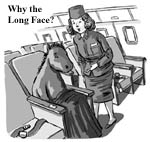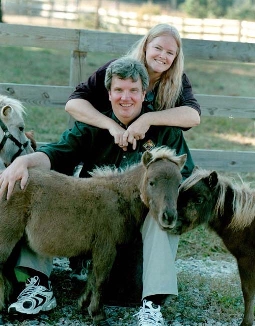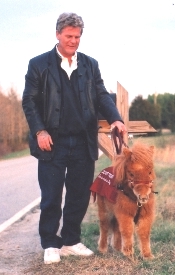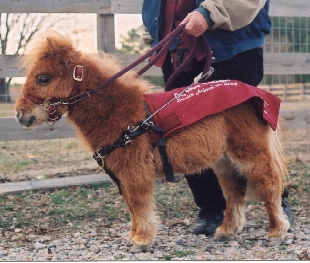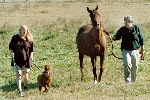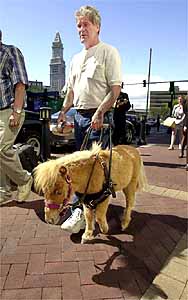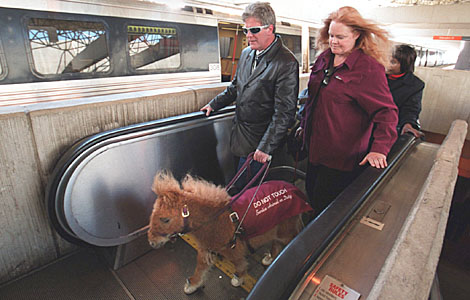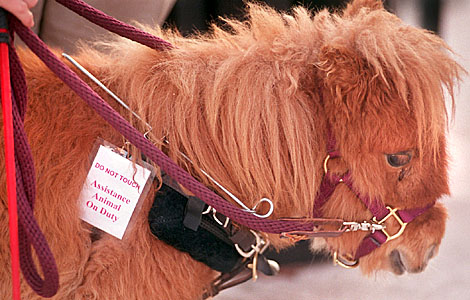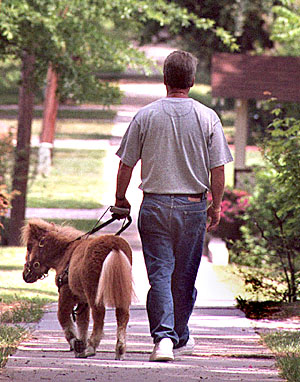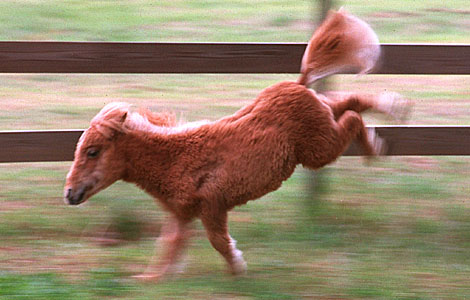|
|
Stable won't let blind women ride on trail.
September 16, 2003.
By Michael D. Sorkin,
The St. Louis Post-Dispatch.
The owner of a riding stable here says he turned down two women who
wanted to rent and ride horses on his trails because both women are
legally blind.
"If they can't drive cars, they shouldn't ride horses where they have to
cross creeks, make turns and steer on rough terrain," said Bill Spell,
an owner of Ace Stable in north St. Louis County.
The women responded by filing a discrimination complaint this week with
the Missouri Commission on Human Rights, arguing that the stable
violated state and federal law.
"It made me want to take action so the next blind person won't be
treated this way," said Chasity Jackson, 22, one of the women.
"Blindness is something you get used to," she said. "For us, riding is
easy."
The stable is located on 40 acres near Interstate 170 and Natural Bridge
Road. Spell's family has owned the stable and raised and trained horses
for 60 years.
The location is a mile west of the University of Missouri at St. Louis,
where Jackson lives and is a senior majoring in mass communications.
Last Wednesday, her friend, Ellen Nichols, 23, flew in for a week's
visit. Nichols lives in Seattle and has a job traveling and raising
money for a nonprofit charity.
On Sunday, the women decided to go riding. Jackson, who can see trees
and other large objects, used speech-reading software to check the
Internet for local stables. They settled on Ace, which advertises that
its riding instructors are "experienced working with children and
adults."
Jackson called to check the prices - $15 for 45 minutes - and says she
did not volunteer that they are blind.
"I felt that since the stable is open to the public, it shouldn't make a
difference," she said.
They rode in a cab to the stable - where employees immediately noticed
their white canes.
Everyone agrees on what happened next: Spell turned them down flat.
Not because they wanted to ride, he says. Plenty of blind people and
others with disabilities ride horses.
But not, he said, on trails.
"They can't turn or make the hills or slant," he insisted. "Everything
about this place is predicated on the fact that you have to balance and
see where you're going.
"It would be like training blind with a bat at a baseball game. I don't
know how you could hit the ball."
State law requires stables to post warning signs. Ace's sign is posted
in front of the main building and also inside the arena. It reads:
"Warning. Under Missouri law an equine professional is not liable for an
injury to or the death of a participant in equine activities resulting
from the inherent risk. ..."
Both women say they have ridden trails before. Jackson says she rode
horses "three or four memorable times" in Wentzville a few years ago.
Nichols rode six or seven times, between the ages of 11 and 16.
At Ace, a trail guide rides with each group. The women say all they
needed was for the guide to ride in front and warn them of coming turns
and low branches.
"We tried to reassure him that all he had to do was have a trail guide
tell us which way to go," Nichols said.
Spell and his wife, Beverly, said they feared for the safety of the
women as well as the horses.
"I wouldn't be comfortable if I were blindfolded on a horse," Beverly
Spell said. She said anyone with a serious disability "would be a
problem" on the trails.
Missouri law prohibits discrimination in public accommodations, based
upon race, color, religion, national origin, sex, ancestry or
disability. It is unlawful to withhold or segregate services for any of
those reasons. Most states have similar laws, which are based upon the
federal Americans with Disabilities Act.
Many blind people ride and even compete in riding competitions, says
Michael Kauffman, educational director for the North American Riding for
the Handicapped Association. The association represents 670 riding
centers for the disabled nationwide.
Blind riders often need assistance so they know where the jumps and
gates are in arenas, Kauffman said. "They can become tremendously
competent," he said.
"The question is, did this place just turn them down? Or did they try to
accommodate them and offer alternatives?" Kauffman said.
Bill Spell says he suggested that the women try one of the association's
riding centers, two of which are located in the St. Louis area.
"Those don't have trails," he said.
That's just the problem, the women said. It's the trails they wanted.
Said Kauffman: "This is a very complicated question. There's definitely
two sides to it."
Reporter Michael D. Sorkin:
E-mail: msorkin@post-dispatch.com
Phone: 314-340-8347
[an error occurred while processing the directive]
|

